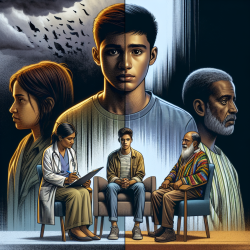Understanding the Mental Health Needs of Post-Conflict Youth: Insights from Liberia
As a special education director, it's essential to stay informed about the latest research and strategies to support the mental health of students, especially those who have experienced trauma. The study titled A mental health needs assessment of children and adolescents in post-conflict Liberia: results from a quantitative key-informant survey offers valuable insights into the challenges faced by young people in post-conflict settings and provides guidance on how practitioners can enhance their skills and approach to therapy.
Key Findings from the Study
The study conducted in Liberia highlights the significant mental health challenges faced by children and adolescents who have lived through civil war. Key informants identified several traumatic events that have had a profound impact on the emotional well-being of Liberian youth, including:
- Conflict/war stress
- Poverty
- Sexual violence
- Exposure to extreme fear
- Witnessing atrocities
These experiences have led to a range of emotional and behavioral problems, such as poor concentration, delinquent behavior, lack of motivation, and substance abuse.
Implementing the Research Outcomes
Practitioners can improve their skills by incorporating the following strategies based on the study's outcomes:
- Trauma-Informed Care: Understand the impact of trauma on mental health and tailor interventions to address the specific needs of trauma-affected youth.
- Community-Based Support: Leverage existing community resources, such as medical clinics, volunteer programs, and sports activities, to provide accessible mental health services.
- Holistic Approach: Address both internalizing and externalizing symptoms by focusing on emotional regulation, social skills development, and resilience building.
- Collaboration with Families: Engage families in the therapeutic process to strengthen support systems and improve outcomes for youth.
Encouraging Further Research
While this study provides valuable insights, it also highlights the need for further research to better understand the complex interplay between trauma, mental health, and functional impairment in post-conflict settings. Practitioners are encouraged to contribute to this growing body of knowledge by conducting their own research and sharing findings with the broader community.
To read the original research paper, please follow this link: A mental health needs assessment of children and adolescents in post-conflict Liberia: results from a quantitative key-informant survey.










